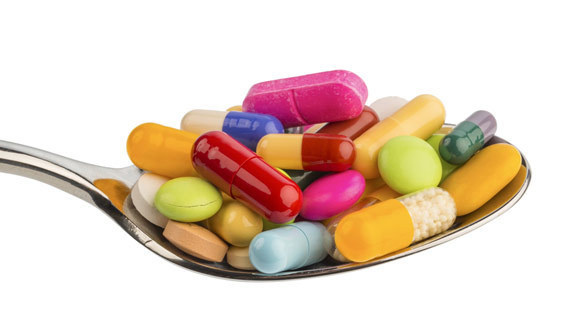Thyroid receptors are present in every cell in the body, and the thyroid hormones affect all major systems – having a direct impact on digestion, metabolism, cholesterol, body temperature, glucose tolerance, cognitive function, and fertility (to name a few).
Sadly, thyroid dysfunction is on the rise. And though it’s rarely discussed, synthetic hormone medications are commonly prescribed. With Levothyroxine being one of the top selling pharmaceutical drugs (at #4), and a recent paper showing that hypothyroidism now affects 10% of women over 60.

But what’s worse, is that many are experiencing symptoms without knowing that it could be related to their thyroid. Most notably, those surrounding mental health:
- brain fog
- weight gain
- digestive problems
- fatigue
- low libido
- depression
- dry skin
- hair loss
- weak bones
- cold intolerance
- irregular periods
- muscle pain
- infertility
- dementia
Which isn’t to say that any or all of these symptoms are related to a thyroid problem; or that any or all of these symptoms means you should be on a thyroid drug. But it is to say that your health and body composition struggles could be from a thyroid issue. And more importantly, this thyroid issue is probably related to an auto-immune condition.
“An autoimmune cause accounts for approximately 90% of adult hypothyroidism, mostly due to Hashimoto’s disease.”
What’s interesting, is that many doctors know this, but don’t bother telling their patients, because the cause doesn’t change the treatment (for them at least). They’d rather wait til the immune system destroys the thyroid tissue and prescribe thyroid replacement drugs. Since the only other option (for them) is suppressing the immune system (with drugs) to prevent the thyroid damage – and this has disastrous side effects.
But what’s sad, is that those with Hashimoto’s are usually susceptible to other tissue damage as well (specifically of the gut and brain). Meaning, those going through this process of thyroid tissue destruction followed by hormone replacement therapy, are going to continue to suffer. Whether we’re looking at the treatment itself (which has it’s own list of side effects), or the fact that the immune response behind the initial thyroid damage will continue to damage other areas of the body. At which point, the patient will be put on additional medications; for depression, diabetes, or whatever develops as a result.

Fortunately, there is an alternative treatment if you’re suffering from this condition (which by the way, is the most common autoimmune condition in the U.S.) or suffering an underactive thyroid without the autoimmune component. In both cases, it starts with:
- Reducing inflammation – as this is this is what disrupts thyroid production (HPT axis), decreases thyroid receptor sites, and inhibits thyroid conversion (T4-T3)
- Controlling blood sugar – as chronically elevated insulin damages the thyroid, frequent bout of hypoglycaemia (after insulin drops and cortisol spikes) disrupts thyroid function, and obesity, diabetes, and the metabolic syndrome are commonly associated with thyroid disorders.
For those with Hashimoto’s disease, this can be a little more challenging, as there’s generally something other than diet and lifestyle driving the inflammation. With most auto-immune sufferers having some sort of genetic susceptibility or environmental exposure that’s dysregulating the immune system and leaving them chronically inflamed. But this isn’t to say avoiding inflammatory behaviour that’s clearly controllable isn’t step 1.
Just like it is for EVERYONE else – thyroid problems, health issues, weight struggles or not!

Individuals with thyroid issues should also look to prioritize the following:
- Going completely gluten and wheat-free (1, 2, 3, 4, 5, 6)
- Getting adequate sun exposure or taking vitamin D3 (1, 2)
- Finding ways to reduce stress (1, 2, 3)
- Optimizing gut health (1, 2, 3)
Outside of that, supplementation with iodine can work for a hypoactive thyroid BUT ONLY IF YOU DON’T HAVE HASHIMOTO’S. As oddly, supplemental iodine seems to increase the autoimmune response (1, 2, 3, 4, 5), while iodine restriction can restore thyroid function for Hashimoto’s sufferers.
Though what’s even more odd, is that this only appears to be the case when there’s a selenium deficiency (1, 2). Which is why including selenium supplementation (200-400mcg) with any thyroid raising iodine protocol (150<1000mcg) is encouraged to prevent toxicity (1, 2, 3, 4). In addition to getting tested for Hashimoto’s (if you suspect it) before taking any iodine supplements.
For those that don’t suspect Hashimoto’s, and notice drastic improvements in hypothyroid symptoms after adopting an anti-inflammatory diet and lifestyle, a healthy intake of sea vegetables, salt-water fish, and quality sea salt appears to be enough to prevent an iodine deficiency. With generous amounts of salt recommended for those that sweat, stress, and exercise a lot.
Worried About Salt? Read This.
Selenium deficiency shouldn’t be a problem if you’re eating plenty of meat, fish and eggs, and have a healthy gut. But if you’re concerned about your intake, or think it could help your thyroid (1, 2, 3), a few brazil nuts go a long way.
Stay Lean!
Coach Mike
RELATED ARTICLES:
How Stress Makes You Fat & Sick
Zonulin - Connecting Wheat & Leaky Gut
Asthma? Eczema? IBS? Depression? Go wIth Your Gut!
From Chronic Inflammation to Chronic Disease - 10 Ways to Prevent it

